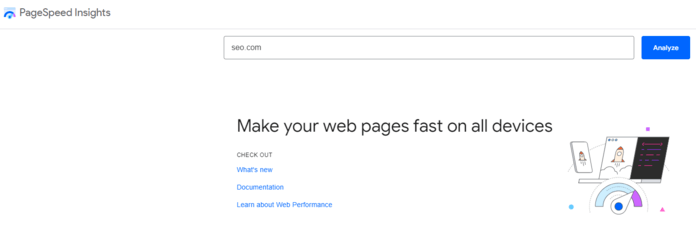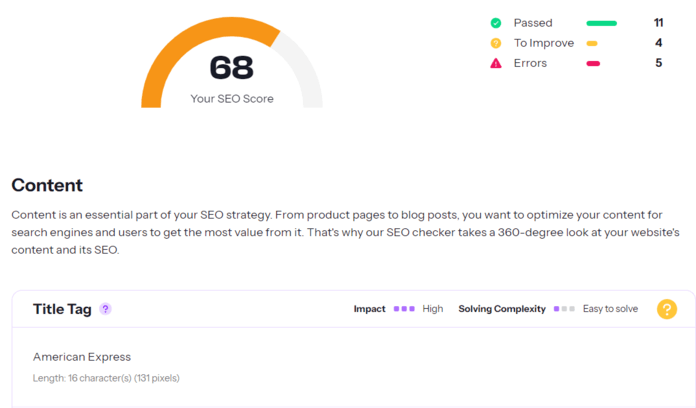
SEO requires continuous monitoring through SEO reports, which summarize metrics like website health, organic traffic, and technical aspects to track improvements and identify issues. Keep reading to learn more about SEO reports!

![]()
Macy Storm Senior Content Creator
An SEO report is a summary of metrics that indicate how your website performs in search results.
Search engine optimization (SEO) is a long-term investment that requires continuous monitoring to ensure it’s producing the results you desire. That’s why it’s important to generate an SEO report — this report will tell you what’s working, what isn’t, and what needs improvement.
If you’ve never created an SEO report, you’ve come to the right place. We’ll break down everything you need to know about SEO reporting, including:
An SEO report is a summary of metrics that indicate how your website performs in search results. These search metrics allow you to track your SEO’s performance and better understand where you need to improve your SEO strategy.
Your SEO report will look at areas like:
An SEO rank report is slightly different from a standard SEO report. An SEO ranking report looks solely at your website’s performance in search results over time. This report helps you see what pages rank well, how page rankings change over time, and more.
This report tells you how you’re performing in search results, but doesn’t tell you the cause. If your rankings dropped, for example, a ranking report won’t tell you why.
An SEO report, on the other hand, can give you an idea of why it may have happened. If your SEO report comes back saying your website is too slow, it could be the reason for your dropped rankings.
Using these two reports in conjunction with each other can give you a better overall picture of your SEO performance.
Don’t let a complicated interface slow you down. Find opportunities faster with SEO.com!
SEO reports can be broken down into two main types:
So, what’s the value in running an SEO report? How does it benefit your business?
Here are a few reasons you’ll want to run regular SEO reports:
So, you’ve been convinced of the benefits of running an SEO report — now where do you start? Let’s break down how to create an SEO report in five easy steps so you can get started!
The first step to creating an SEO report is determining what key performance indicators (KPIs) to include in your report. These metrics are the ones that matter most to your business and are the best indicators of whether you’re achieving your goals.
Some common metrics included in SEO reports include:
The metrics you include will vary depending on your business’s goals and what matters most to you.
Once you know what you’re tracking, you’ll want to determine how you run an SEO report. If you just started with SEO, you’ll want to wait at least six months to do your SEO reporting. Since SEO is a strategy that takes time to show results, you’ll want to wait a few months to do your report.
If you’ve already had your SEO strategy in place for a while, you’ll want to determine how often you want to track and report on your SEO. You can opt to report bi-weekly, monthly, or quarterly.
The most difficult of all the steps in creating an SEO report is designing your report. You’ll want to choose a layout that is logical, organized, and easy to read.
You can opt to create a spreadsheet, PDF, or a slideshow to gather all your data. If you aren’t sure how you want it to look, you can always find a SEO report template that fits your business’s needs.
Once your template is set, the next step in SEO reporting is to determine what tools you’ll use to help fill your report. What tools you use largely depends on what metrics you include in your SEO report.
Google Analytics is a great tool to use to gather data on your SEO. You can see information on organic traffic, conversions, and more. If you wanted to check page speed, you could use Google PageSpeed Insights or other site speed tools.

Once you know what tools you’ll use to provide the data, you can start putting that data into your SEO report.
Once you have all your data in your SEO report, you can see the bigger picture of your SEO performance. You can identify where your performance has dropped and where you need to make improvements.
After understanding where you fall short, you can create a strategy to start improving your SEO efforts.
Not sure where to start with improving your SEO? Check out this blog post for tips on how to improve your search engine performance!
The majority of an SEO report will focus on key performance indicators (KPIs), which help show how whether or not you are meeting goals.
Consider adding metrics like:
Now that you’ve seen how to create an SEO report, you may feel overwhelmed — there’s a lot to do. If you feel like creating a manual report will take too much time, consider using an SEO reporting tool instead.
SEO Checker, for example, is a free tool you can use that enables you to input your website’s URL to get a report on your SEO. It automatically scans your website and detects issues with your SEO.

SEO Checker will provide a detailed report on your:
You’ll get a breakdown of the impact of those issues, how easy they are to solve, and how to solve them.